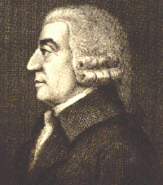
Adam Smith on the “Wonder, Surprise, and Admiration” one feels when contemplating the physical World (1795)
About this Quotation:
As we continue to explore the complete works of Adam Smith in the Glasgow Edition republished by Liberty Fund, we find many unexpected gems. Here we see Smith lecturing on science to undergraduates and expressing his heartfelt admiration for the beauty of the physical world.
Other quotes from this week:
- 2009: Cesare Beccaria says that torture is cruel and barbaric and a violation of the principle that no one should be punished until proven guilty in a court of law; in other words it is the “right of power” (1764)
- 2008: Jean-Baptiste Say argues that there is a world of difference between private consumption and public consumption; an increase in the latter does nothing to increase public wealth (1803)
- 2006: In Shakespeare’s The Tempest Caliban complains about the way the European lord Prospero taught him language and science then enslaved him and dispossessed him of the island on which he was born (1611)
- 2005: Herbert Spencer makes a distinction between the “militant type of society” based upon violence and the “industrial type of society” based upon peaceful economic activity (1882)
Other quotes about Science:
- 2010: Voltaire laments the destruction of Lisbon in an earthquake and criticises the philosophers who thought that “all’s well with the world” and the religious who thought it was “God’s will” (1755)
- 2009: Charles Darwin on life as a spontaneous order which emerged by the operation of natural laws (1859)
14 June, 2004
 | Adam Smith on the “Wonder, Surprise, and Admiration” one feels when contemplating the physical World (1795) |
In a lecture on Astronomy Adam Smith explores the range of feelings one feels when observing the wonders of nature and the beauties of the physical world:
We wonder at all extraordinary and uncommon objects, at all the rarer phaenomena of nature, at meteors, comets, eclipses, at singular plants and animals, and at every thing, in short, with which we have before been either little or not at all acquainted; and we still wonder, though forewarned of what we are to see.
The full passage from which this quotation was taken can be be viewed below (front page quote in bold):
Wonder, Surprise, and Admiration, are words which, though often confounded, denote, in our language, sentiments that are indeed allied, but that are in some respects different also, and distinct from one another. What is new and singular, excites that sentiment which, in strict propriety, is called Wonder; what is unexpected, Surprise; and what is great or beautiful, Admiration.
We wonder at all extraordinary and uncommon objects, at all the rarer phaenomena of nature, at meteors, comets, eclipses, at singular plants and animals, and at every thing, in short, with which we have before been either little or not at all acquainted; and we still wonder, though forewarned of what we are to see.
We are surprised at those things which we have seen often, but which we least of all expected to meet with in the place where we find them; we are surprised at the sudden appearance of a friend, whom we have seen a thousand times, but whom we did not imagine we were to see then.
We admire the beauty of a plain or the greatness of a mountain, though we have seen both often before, and though nothing appears to us in either, but what we had expected with certainty to see …
These sentiments, like all others when inspired by one and the same object, mutually support and enliven one another: an object with which we are quite familiar, and which we see every day, produces, though both great and beautiful, but a small effect upon us; because our admiration is not supported either by Wonder or by Surprise: and if we have heard a very accurate description of a monster, our Wonder will be the less when we see it; because our previous knowledge of it will in a great measure prevent our Surprise.
It is the design of this Essay to consider particularly the nature and causes of each of these sentiments, whose influence is of far wider extent than we should be apt upon a careless view to imagine. I shall begin with Surprise.